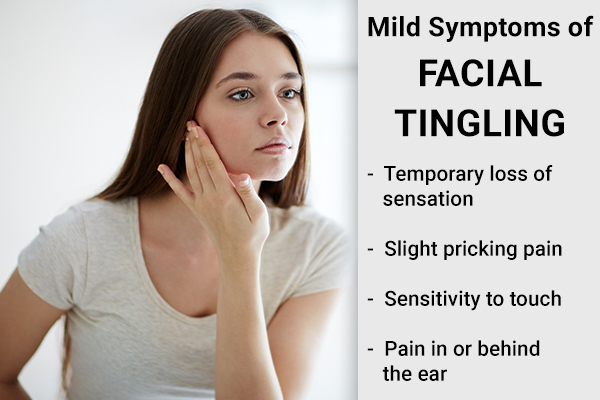In this article:
Facial tingling can be described as a mild sensation of being pricked by pins and needles along with some degree of numbness. It is referred to as facial nerve palsy (FNP) in medical terminology and can be quite unpleasant and distressing. (1)

This article will give you all the relevant information to understand this condition better and manage it properly.
Causes of Facial Tingling
Facial tingling or numbness usually occurs when the underlying nerves become damaged, compressed, or irritated. Sometimes, disruptions in the normal body chemistry can also hamper nerve function and trigger such symptoms.
Most causes are not dangerous, but when muscle weakness or paralysis is also present, tingling and numbness should be treated as an emergency.
Here are some conditions that can trigger tingling or numbness in your face for different reasons:
- Vasculitis, which restricts blood flow to nerves in the body, leading to loss of sensation
- Stroke, which reduces blood supply to the brain such that it can’t receive and process the nerve signals properly
- Panic disorder/anxiety attack (2)
- Damage in the part of the pathway for sensation
- Physical trauma, injuries, and certain hereditary disorders that cause nerve damage or dysfunction
- HIV, leprosy, herpes, and Lyme disease, which can all cause nerve infection
- Multiple sclerosis and Guillain-Barré syndrome, (3) which can cause inflammation in the facial nerves that may lead to the gradual erosion of their exterior layer called demyelination
- Poorly controlled diabetes, which can cause nerve damage
- Not getting enough vitamins B12 and D, poisoning caused by ingestion of heavy metals (such as lead) or other toxins, and chemotherapy medication, which can all trigger metabolic abnormities that lead to nerve damage/dysfunction (4)
- Sarcoidosis and other such inflammatory conditions that cause the lymph glands to swell up and thereby compress the surrounding nerves (5)
- Connective tissue disease, which is a rare autoimmune disorder that can cause nerve damage and thus may be responsible for facial numbness (5)
- Coronavirus infection that causes nerve tissue injury, as discussed in one case report where one 61-year-old patient had fever, cough, and facial tingling and was diagnosed with COVID-19 (6)
- Tumor inside the nose or one of the sinuses (7)
- Dental problems (7)
- Myofascial pain syndrome (MPS)
- Idiopathic/unknown cause (such as in the case of Bell’s palsy)
Associated Symptoms of Facial Tingling
Facial tingling may be limited to one or both sides of the face and is often accompanied by other symptoms.
Mild symptoms associated with facial tingling include:

- Temporary loss of sensation
- Slight pricking pain
- Sensitivity to touch
- Pain in or behind the ear
Severe symptoms associated with facial tingling include:
- Burning pain that worsens at night
- Muscle wasting or weakness that causes drooping of the mouth and slurred speech
- Organ or gland dysfunction
If these symptoms only affect one side of the face, it is called unilateral FNP. Most cases of FNP fall in this category, nearly half of which are idiopathic and referred to as Bell’s palsy. (1)
If the symptoms affect both sides of the face, it is called bilateral FNP or facial diplegia, which is quite uncommon as it affects only 1 per 500,000 population.
Treatment for Facial Tingling
Treatment for facial tingling depends on its underlying cause. Mild cases are generally benign, involve minimal pain, and tend to resolve on their own.
If the condition is triggered by anxiety and stress, adopting relaxation therapies and favorable lifestyle modifications can help manage it at home.
However, most causes of facial tingling run the risk of causing severe nerve damage and other problems, so it’s best to seek medical evaluation for a proper diagnosis and treatment.
Some common treatment options include the following:
- Your doctor may suggest antivirals, corticosteroids, anti-anxiety medications, and pain relievers to combat your symptoms. (8)
- If Guillain-Barré syndrome is responsible for your symptoms, you will need supportive care and treatment with intravenous immune globulin (IVIg) or plasma exchange (PE) to control the disease.
- If facial tingling is stemming from mental, emotional, or behavioral disorders, the doctor will refer you to a psychiatrist (3)
Diagnosing Facial Tingling
Diagnosing the cause of facial tingling involves the following steps:
- Review of medical history
- Inquiring about the symptoms
- Physical examination
- Additional tests such as blood culture and throat culture and tests to check your renal function, liver function, serum electrolyte levels, vitamin B12 levels, and folate and serum ACE (angiotensin-converting enzyme) levels
- Cerebrospinal fluid (CSF) analysis and other neurophysiological tests
- Polymerase chain reaction (PCR) examination of the blood and saliva for herpes and cytomegalovirus (CMV)
- Imaging tests such as brain MRI and chest x-ray
- Electromyography (EMG) and nerve conduction velocity (NCV) to look for any nerve-related disorder
Natural Ways to Deal With Facial Tingling

Facial tingling can be idiopathic, which means it occurs without a discernible cause. This condition is referred to as Bell’s palsy.
Since the cause is unknown, the doctor cannot prescribe a specific treatment to address it.
Alternative therapies are often recommended to patients with Bell’s palsy. However, there are not enough scientific data to back their effectiveness, these nonmedical interventions do target some of the common culprits behind facial palsy and are fairly safe.
Some of the alternative therapies that may help manage facial tingling are:
1. Relaxation therapy
Relaxation therapy includes a variety of techniques and exercises that help relieve tension, stress, and anxiety, which are common triggers for facial tingling. (9)
2. Biofeedback therapy
Biofeedback therapy involves using electronic and other devices to monitor the various physiological functions of your body such as your heart rate.
Keeping track of these largely involuntary bodily functions can help you learn how to modify them at will. The goal is to use this biofeedback to modify your physiology in a way that benefits your physical, mental, emotional, and spiritual health. (10)
3. Nutritional supplementation
Nutritional deficiencies such as low levels of vitamins B12, D, and C as well as zinc and copper (11) have been associated with neuropathy that can trigger facial tingling. (12)
So, your doctor may recommend nutritional therapy or supplements to make up for the lack of these key vitamins and minerals.
4. Herbal treatments
Many medicinal herbs have shown useful in relieving the facial pain and numbness associated with nerve disorders and therefore may help curb facial tingling as well (although there aren’t any direct studies to support this claim).
Curcumin (turmeric), saffron (Crocus sativus), ginkgo (Ginkgo biloba), and bitter gourd or karela (Momordica charantia) are some easily available herbs that can prove effective in this regard. (13)
But you must consult your doctor before using these herbal ingredients.
How to use:
- Add some turmeric and saffron to warm milk and consume this tonic.
- Take ginkgo biloba extract supplementation.
5. Acupuncture
Acupuncture is an ancient Chinese technique of inserting needles in specific points of the body to promote healing. This intervention may help alleviate facial tingling that is accompanied by pain and is generally associated with nerve disorders. (14)
When to See a Doctor

Facial tingling warrants prompt medical attention if:
- It persists for a long time.
- It has a sudden onset.
- It is accompanied by severe pain, muscle weakness, slurred speech, facial drooping, hazy vision, or fatigue.
Final Word
Facial tingling can be a sign of nerve damage or some serious underlying condition that requires proper medical evaluation and care. So, do not take it lightly and do not handle it yourself. Improper or delayed treatment can lead to severe complications.
As far as natural remedies are concerned, there isn’t enough research to support their use for managing this potentially serious condition. If you do decide to try any new remedy or therapy for facial palsy, do consult your doctor first to prevent adverse outcomes.
- Was this article helpful?
- YES, THANKS!NOT REALLY


